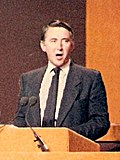| |||||||||||||||||||||||||||||
All 36 metropolitan boroughs, 117 out of 296 English districts and all 53 Scottish districts | |||||||||||||||||||||||||||||
|---|---|---|---|---|---|---|---|---|---|---|---|---|---|---|---|---|---|---|---|---|---|---|---|---|---|---|---|---|---|
| |||||||||||||||||||||||||||||
The 1988 United Kingdom local elections were held on Thursday 5 May 1988. [1] [2] [3] The Conservative government held its ground and remained ahead in the projected popular vote.
Contents
The election resulted in the Conservative Party winning 39% of the popular vote, the Labour Party winning 38% and the Social and Liberal Democrats (SLD) 18%. The Conservatives gained 9 seats, Labour gained 76 seats and the SLD lost 122 seats.
These were the first national elections contested by the SLD, which had just been formed as a merger of the SDP and Liberals after several years of an alliance existing between the two parties.



